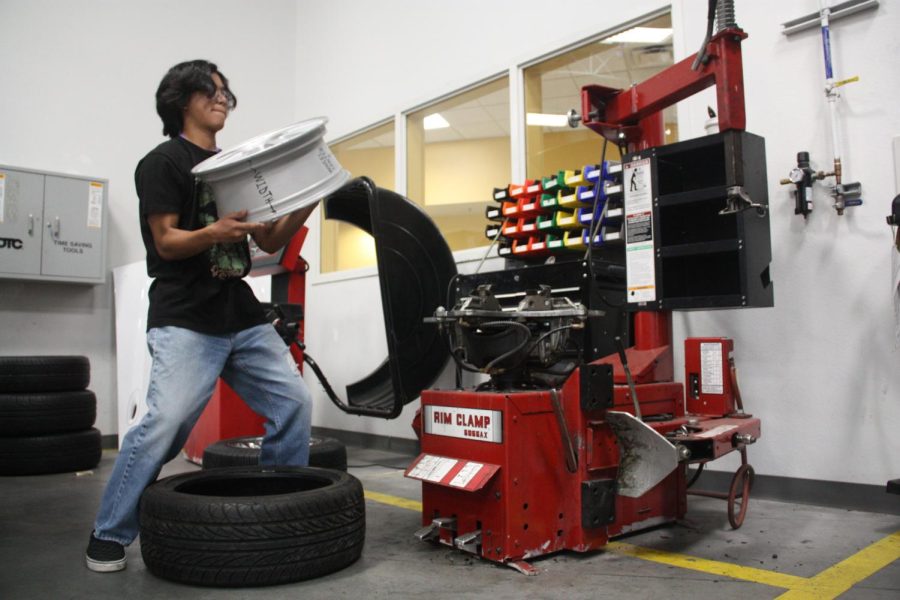EDITORIAL: SCHOOLS SHOULD REQUIRE LIFE SKILLS COURSES TO GRADUATE
Life skills classes are necessary for the lives of students after graduation
Junior Alvin Claro lifts the rim of a tire. The Auto-Tech program teaches students how to apply useful skills to fix up cars.
January 12, 2023
Ideally, high school should play a major role in helping students prepare to be adults. But, spending hours studying different historical battles or methods of calculating algebraic equations continues to be the norm and might be useful when passing exams, but the lack of life skills being taught are leaving many students in a state of disarray upon graduation.
Regardless of a specific college major or career path, everyone has to pay a mortgage and try to maintain a credit score of 700 or over. These skills are required universally, therefore, these classes also need to be required in order to graduate from high school.
To begin, many schools no longer offer the classes our parents took, like Home Economics, public speaking, or personal finance, that teach basic life skills. Not all students have the resources to learn about basic cooking or conversational skills outside of school, and these habits can’t be formed by watching a five-minute video on YouTube about how homeowner’s insurance works.
Right now, most schools don’t offer, or have limited, life skills classes mainly due to budgeting. School budgets are based on the number of students enrolled in a school; each student is assigned a certain amount of money. The more students at a school, the more money the school receives. These dollars are then spent at the discretion of the principal, who decides what is best for their campus and community.
Staffing for schools starts with graduation requirement based courses and anything beyond that is based on what teachers can and want to teach family and consumer science courses. And because these classes are electives, students would rather take dual credit or AP classes that are likely to give them college credit or to pad their transcript, not a class about personal budgeting. While there are some students who have the motivation and self-awareness to make beneficial choices on their own, most high school students lack the foresight needed, until they can’t pay their phone bill or bake a frozen pizza.
Also, students who do well in school don’t have the skills needed for organization, or to live independently, according to author and professor Kris Bigalk. The concept of being “book smart” vs. being “street smart” also comes into play here. Even if students understand complex math equations, that doesn’t mean they have the knowledge it takes to handle practical issues in life.
This multi-generational gap in basic life knowledge suggests that practical skills being taught in a school setting is a thing of the past. And if these social-emotional and employment skills are being forgotten generation by generation, there will eventually be no educators left to teach these skills.
Sewing and cooking are not required to get scholarships and a flourishing career, but it is still crucial that schools integrate practical skills classes into their requirements for graduation. Not only will these skills enhance students’ work ethic in their core classes, but they will also prepare them for adult life.









